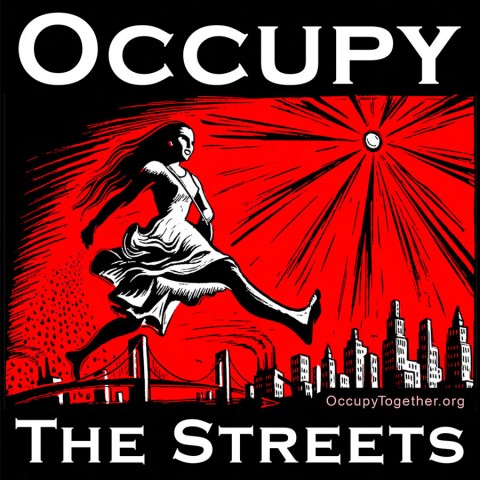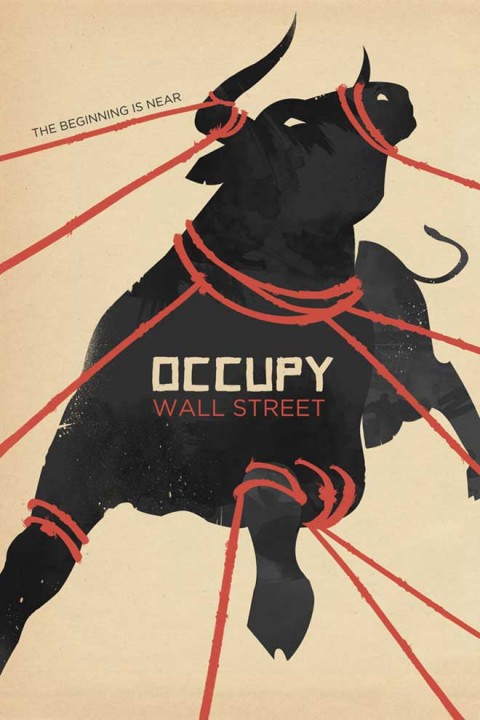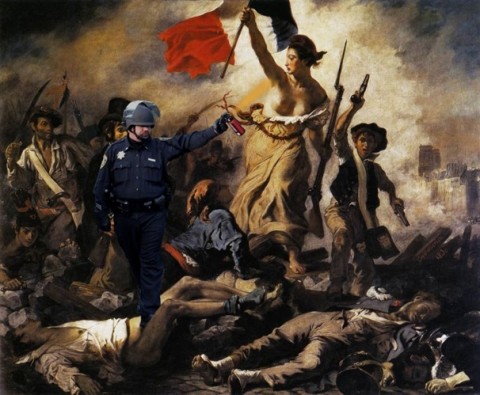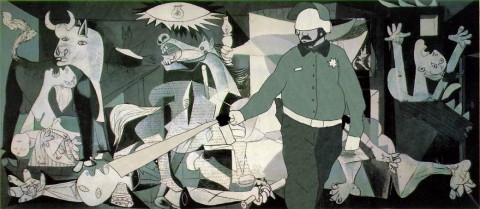Last week, composer Philip Glass and rock legend Lou Reed embraced the Occupy Wall Street movement. Initial video & audio clips capturing their appearances were shoddy at best. Now Jean Thevenin (who joined the protest at Lincoln Center Plaza) has given us a better view, producing a short, elegant film simply called Visible Shape. The accompanying music is “Protest” from Satyagraha, written by Philip Glass and performed by New York City Opera Orchestra.
Crowded House: How the World’s Population Grew to 7 Billion People
This fall, the world’s population reached seven billion. A sobering thought. How did we get to this point? Producer Adam Cole and photographer Maggie Starbard of National Public Radio have put the world’s accelerating population growth in perspective in a two-and-a-half minute video, above.
In those two and a half minutes, 638 babies will be born worldwide, according to statistics from the United States Census Bureau, and 265 people will die. That’s a net gain of 373 people, just while you watch the film. The biggest growth, according to NPR, is happening in sub-Saharan Africa, where access to family planning is low and infant mortality rates are high.
It may seem counter-intuitive that population growth rates are high where infant survival rates are low, but as Swedish global health expert Hans Rosling put it during a recent TED talk, “Only by child survival can we control population growth.” Because population growth and infant mortality rates are both correlated to poverty rates, he argues, eliminating poverty is the key to achieving a sustainable world population. You can learn more in our November 1 feature, “Hans Rosling Uses IKEA Props to Explain World of 7 Billion People.”
Malcolm McLaren: The Quest for Authentic Creativity
In early October of 2009, Malcolm McLaren was nearing death but didn’t know it yet. He showed up at the 2009 Handheld Learning conference feeling fatigued, but managed to deliver a provocative and heartfelt speech titled, “Never Mind the Bollocks, Here’s the Txt Pistols,” in which he reflects on his life growing up in post-World War II England and expresses dismay over the rise of what he called “karaoke culture.”
“All popular culture today,” said McLaren, “goes to great lengths to promote the idea that it’s cool to be stupid.” He championed instead the “messy process of creativity” in which struggle, failure and the acquisition of skill and knowledge are valued above instant fame. You can watch the complete speech above. A few days after it was given, McLaren went into the hospital and learned that he had cancer. He died six months later, on April 8, 2010. The next day Handheld Learning founder Graham Brown-Martin wrote:
The talk from Malcolm at the Handheld Learning Conference 2009 will, I believe, stand the test of time. The speech doesn’t elaborate about the period of the Sex Pistols, New York Dolls, Vivienne Westwood, his impact on design, fashion and music culture and many other important achievements of Malcolm’s life that will be reported in obituaries over the coming days. Instead and in keeping with the theme of the conference, Malcolm discusses in his inimitable style–his life, learning, authenticity vs karaoke culture and what we gain from the experience of failure. Ironically, failure was something Malcolm never achieved. The talk was anything but ordinary, it polarised our audience and instantly trended globally on Twitter but what else would you expect?
Philip Glass, Lou Reed Speak At Occupy Lincoln Center
Last night, two American icons lent support to the Occupy Wall Street movement, speaking at a protest held outside of Lincoln Center in New York City. After a performance of Satyagraha at the Met, Philip Glass spoke to demonstrators. According to Alex Ross, the music critic for the New Yorker, Glass recited the closing lines of Satyagraha (see around 3:00 minute mark in the video above), which come from the Bhagavad Gita:
When righteousness withers away and evil rules the land, we come into being, age after age, and take visible shape, and move, a man among men, for the protection of good, thrusting back evil and setting virtue on her seat again.
He repeated the saying several times, and the “human microphone” amplified the message for him.
Lou Reed was also in attendance and helped someone crawl over a police barricade at one point, then said: “I was born in Brooklyn, and I’ve never been more ashamed than to see the barricades tonight. The police are our army. I want to be friends with them. And I wanna occupy Wall Street. I support it.” A not-so-clear audio clip appears below:
via Gothamist and The Rest is Noise
More Occupy Videos:
Noam Chomsky at Occupy Boston
Slavoj Zizek Takes the Stage at Occupy Wall Street
Joseph Stiglitz and Lawrence Lessig at Occupy Wall Street
David Crosby & Graham Nash at Occupy Wall Street; Echoes of Woodstock
Striking Posters From Occupy Wall Street: Download Them for Free
Occupy Wall Street and the global Occupy Movement have inspired some striking artwork. Graphic artists from around the world (including Shepard Fairey mentioned here earlier today) have contributed their talents to the movement. Many of their posters are available for free or at low cost, either directly from the artist or through organizations like Occuprint and OccupyTogether. You can post them in your town.
New Yorker cover artist and book illustrator Eric Drooker has created several beautiful posters, including the one above. You can download a high-resolution copy suitable for printing at OccupyTogether.org.
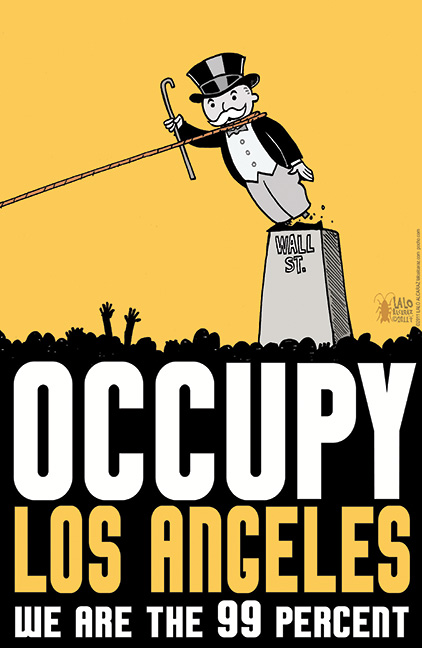
The noted Los Angeles graphic artist, cartoonist and radio personality Lalo Alcaraz created this parody of the toppling of the Saddam Hussein statue in Baghdad for Occupy Los Angeles. In a message on his website, Alcaraz invites people to distribute the image.
Alexandra Clotfelter is a student of advertising design and illustration at the Savannah College of Art and Design in Georgia. Since donating her design, “The Beginning is Near,” to Occuprint.org, it has become one of the most popular posters to emerge from the movement. In response to requests, Clotfelter is offering a high-quality Giclee print for sale, with a portion of the profits going to support Occuprint’s project of distributing free posters worldwide.
In this poster, Zucotti Park is portrayed as the “Tip of the Iceberg.” Indeed, the Occupy movement extends to places like Lawrence, Kansas, where muralist, printmaker and writer Dave Loewenstein is based. Loewenstein’s design is available for free at Occuprint.org.
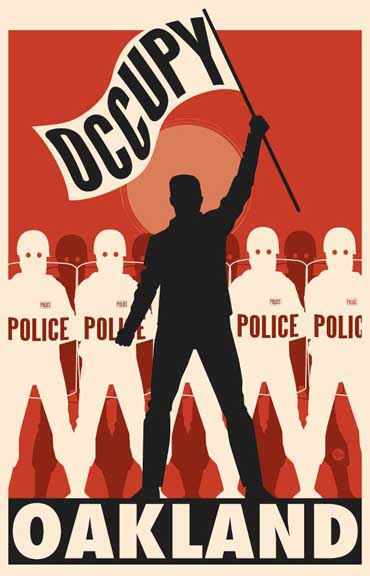
Poster artist Rich Black of Berkeley, California created this image for Occupy Oakland. It’s available for free download at Occuprint.org.
To see a variety of Occupy posters by other artists (and to download them for free) you can visit Occuprint.org and OccupyTogether.org.
And don’t miss our post earlier today: Shepard Fairey Caves In, Revises Occupy Wall Street Poster.
Shepard Fairey Caves In, Revises Occupy Wall Street Poster
Shepard Fairey’s famous 2008 Obama “Hope” poster has been the source of countless imitations and parodies. Last week Fairey released his own parody for Occupy Wall Street, replacing Obama’s head with a hooded figure in a Guy Fawkes mask, along with the words, “Mister President, We HOPE You’re On Our Side.” As Fairey explained on his website, “I see Obama as a potential ally of the Occupy movement if the energy of the movement is perceived as constructive, not destructive.”
Not everyone agreed. Yesterday, after a series of discussions with one of the organizers of the purportedly leaderless movement, Fairey announced he was backing down and dropping the provocative message to the president and replacing it with “We Are The HOPE.” A few of the movement’s organizers reportedly thought Fairey’s poster implied that Occupy Wall Street either supported Obama or was begging for his support.
“As Obama has raised more money from Wall Street than any other candidate in history, it would make us naive hypocrites to support him under present circumstances,” the anonymous organizer wrote to Fairey. “As for the design, the fact that you put the 99% inside the Obama O is crossing a sacred line. While it definitely looks cool, whether intended or not, this sends a clear message that Obama is co-opting OWS.”
“I have no interest in pandering to Obama,” responded Fairey. “I see my image as a reminder to him that he has alienated his populist progressive supporters.”
But Fairey submitted to the pressure and changed his design anyway. You can read more about the exchange here, and see the altered version of Fairey’s poster below.
For more Occupy Wall Street posters, stay tuned for our post coming later today.…
The Battle for LA’s Murals
Los Angeles has long been known as the street mural capital of the world. But in the past few years the city has painted over more than 300 murals, according to the Los Angeles Times, enforcing a decade-old ordinance that makes it a crime to create murals on most private properties. “The mural capital of the world is no more,” street artist Saber told the Times. “They buff beautiful pieces, harass property owners and threaten us like we are in street gangs.”
Some of the problems started in 1986, when the city was looking for a way to alleviate the growing scourge of billboard blight. The city was being blanketed with unsightly commercial advertising, so the Los Angeles City Council adopted a code to reduce commercial billboards. The new restrictions exempted artwork. Advertisers responded by suing the city, arguing that they had the same right of free speech as the muralists. So in 2002 the Council “solved” the matter by amending the code to include works of art. “The law left many murals technically illegal,” wrote the Times in an Oct. 29 editorial, “no matter how talented the artist or how willing the owner of the wall or how inoffensive the subject matter.”
Since then, murals that were already in existence have come under increasing threat from two sides: from graffiti “artists” who mark their territory by defacing murals, and from a city that seems determined to find any pretext to paint over them. This is the subject of Behind the Wall: The Battle for LA’s Murals (above), a six-minute documentary by students in the Film and TV Production MFA program at the University of Southern California. It was directed by Oliver Riley-Smith, shot by Qianbaihui Yang, and produced and edited by Gavin Garrison.
Without addressing the issue head-on, the film makes some progress toward illuminating the distinction between street art and vandalism. Muralists like Ernesto De La Loza, who is featured in the film, receive permission from property owners and then spend months creating their art. Later, someone comes along with a can of spray paint and tags it. Should the muralist and the graffiti artist have equal cultural status?
Related Content:
Lt. John Pike Pepper Sprays His Way Into Art History
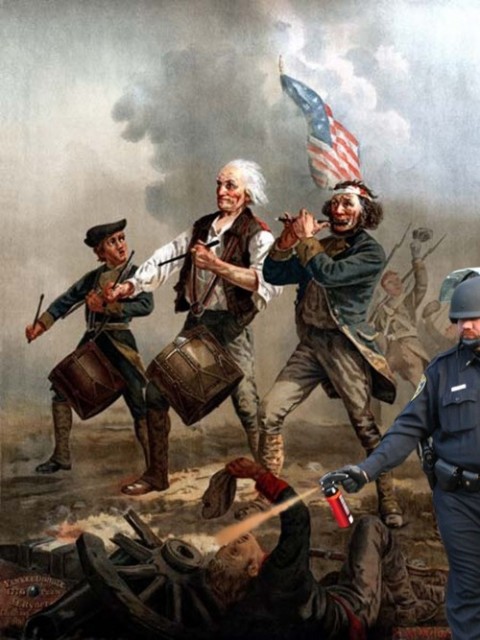
Pepper spray students in the face on Friday, and you wake up the face of evil on Saturday. Then, the brunt of some clever jokes on Monday. Look! There’s Lieutenant John Pike popping into the famous painting, The Spirit of ’76, and macing a wounded soldier while he’s down. That’s low.
Now the symbol of French freedom, Delacroix’s Liberty Leading the People. Is Pike using pepper spray? Or, on closer inspection, is that a shot of deodorant? Quel con ce mec.
Freedom from Want is part of Norman Rockwell’s Four Freedoms series of paintings. And guess who is ruining freedom, Thanksgiving and everything wholesome?
Yes, he eventually desecrates Picasso’s anti-war mural, Guernica, too.
A baby seal? WTF Pike?!!
More art history fun awaits you at the PepperSprayingCop Tumblr site.
H/T Heather and WashPo
